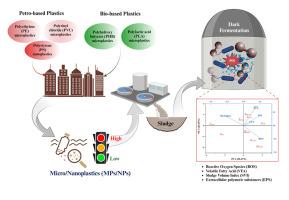石油与生物基纳米/微塑料对污泥发酵生物制氢的影响
IF 8.1
2区 工程技术
Q1 CHEMISTRY, PHYSICAL
引用次数: 0
摘要
通过暗发酵生产生物氢为废物变生物能源提供了一条前景广阔的途径。废物中新出现的污染物,如微塑料(MPs)和纳米塑料(NPs)对发酵制氢的影响尚未得到深入研究。值得注意的是,在氢气发酵过程中,尚未对石油基和生物基 MPs/NPs 进行系统比较。我们研究了石油衍生的聚乙烯 MPs、聚氯乙烯 MPs、聚苯乙烯 NPs 以及生物基的聚羟基丁酸 MPs 和聚乳酸 MPs 在低浓度和高浓度下对初级污泥制氢的影响。产氢抑制率从 8.2% 到 82.4%不等,高浓度石油基 MPs/NPs 的抑制作用更为明显。与石油基 MPs/NPs 相比,生物基 MPs 的抑制率较低。与对照组相比,0.3 毫克/升的 PsNPs 表现出最高的抑制作用,同时活性氧也增加了最高(77.3%)。高浓度的 MPs/NPs 增加了细胞外聚合物质的产生,表明了对毒性的保护性反应。这些发现凸显了研究废水污泥中新出现的 MPs/NPs 污染物如何影响发酵产氢和污泥特性的重要性。本文章由计算机程序翻译,如有差异,请以英文原文为准。

Impact of petroleum versus bio-based nano/microplastics on fermentative biohydrogen production from sludge
Biohydrogen production via dark fermentation offers a promising route for waste-to-bioenergy. The impact of emerging contaminants like microplastics (MPs) and nanoplastics (NPs) in the waste on fermentative hydrogen production has not been thoroughly examined. Notably, a systematic comparison between petroleum-based and bio-based MPs/NPs in the hydrogen fermentation process has not yet been explored. We investigated the effects of petroleum-derived polyethylene MPs, polyvinyl chloride MPs, polystyrene NPs, and bio-based polyhydroxy butyrate and polylactic acid MPs, at low and high concentrations, on hydrogen production from primary sludge. Inhibition of hydrogen production ranged from 8.2% to 82.4%, with high concentrations of petro-based MPs/NPs causing more significant inhibition. Bio-based MPs exhibited lower inhibition compared to petro-based MPs/NPs. PsNPs at 0.3 mg/L exhibited the highest inhibition, accompanied by the highest increase (77.3%) in reactive oxygen species compared to the control. High levels of MPs/NPs increased extracellular polymeric substance production, indicating a protective response to toxicity. These findings highlight the importance of studying how emerging MPs/NPs pollutants in wastewater sludge impact fermentative hydrogen production and sludge properties.
求助全文
通过发布文献求助,成功后即可免费获取论文全文。
去求助
来源期刊

International Journal of Hydrogen Energy
工程技术-环境科学
CiteScore
13.50
自引率
25.00%
发文量
3502
审稿时长
60 days
期刊介绍:
The objective of the International Journal of Hydrogen Energy is to facilitate the exchange of new ideas, technological advancements, and research findings in the field of Hydrogen Energy among scientists and engineers worldwide. This journal showcases original research, both analytical and experimental, covering various aspects of Hydrogen Energy. These include production, storage, transmission, utilization, enabling technologies, environmental impact, economic considerations, and global perspectives on hydrogen and its carriers such as NH3, CH4, alcohols, etc.
The utilization aspect encompasses various methods such as thermochemical (combustion), photochemical, electrochemical (fuel cells), and nuclear conversion of hydrogen, hydrogen isotopes, and hydrogen carriers into thermal, mechanical, and electrical energies. The applications of these energies can be found in transportation (including aerospace), industrial, commercial, and residential sectors.
 求助内容:
求助内容: 应助结果提醒方式:
应助结果提醒方式:


